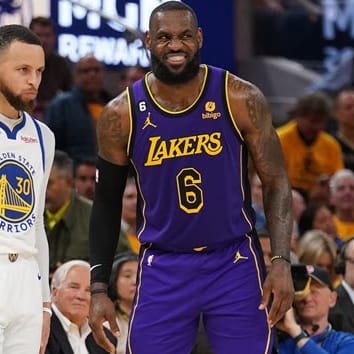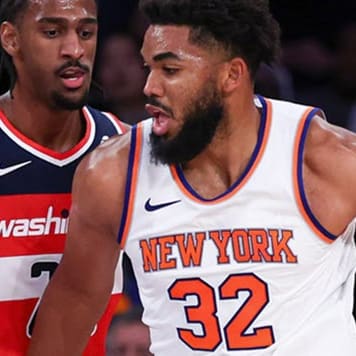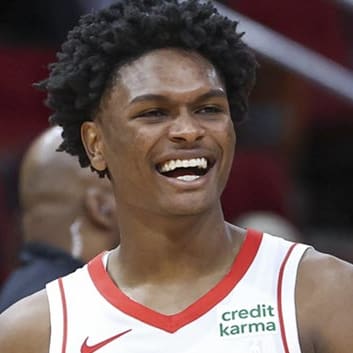This article is part of our Season Review series.
 Bulls (22-60), preseason over/under: 30.0 wins
Bulls (22-60), preseason over/under: 30.0 wins
The Good
The Bulls inking Zach LaVine to a four-year, $78 million contract last summer was met with plenty of skepticism. LaVine played just 24 games the year prior while recovering from a torn ACL, and there were major concerns about his defensive capabilities. While his defense remains very much a work in progress, LaVine continued to make strides as an offensive threat. He averaged 23.7 points on 46.7 percent shooting, 4.7 rebounds, 4.5 assists, 1.9 threes and 1.0 steal in 34.5 minutes.
Many fantasy owners were cautious due to his injury history and drafted LaVine in the sixth or seventh round, and that's about the value he returned, in terms of total production. Another piece of Chicago's young core, Lauri Markkanen, made some strides, too. The sophomore set career-highs nearly across the board, but he was limited to just 52 games, with most of the missed time coming early in the season due to an elbow injury. Bad luck aside, Markkanen looks the part of a high-level fantasy asset. He finished the season as a top-55 player in terms of average production, which is a strong rank for any 21-year-old.
Otto Porter, who came to Chicago mid-season via trade (more on that below), looks like he'll see an increased role moving forward. After joining the Bulls, he averaged 17.5 points, 5.5 rebounds, 2.7 assists, 2.6 threes and 1.2 steals in 32.8 minutes, taking 2.6 more field-goals, 1.0 more threes and 0.5 more free-throw attempts than he did with the Wizards. His fantasy stock is on the rise heading into next season.
The Bad
Injuries ravaged the Bulls. Zach LaVine was the only player on the roster to start more than 51 games or play more than 1,700 minutes. Kris Dunn arguably took a step back while only playing 46 games, hurting fantasy owners banking on a bounce-back. Promising rookie Wendell Carter Jr. looked lost at times and excellent at others, but he played only 1,110 minutes across 44 games -- another injury casualty. Jabari Parker quickly fell out of favor with the coaching staff and ended up being shipped to the Wizards along with Bobby Portis (and a 2023 second-round pick) in exchange for Porter. A few other players emerged as decent deep-league-only or streaming options late in the season, but it's tough to feel good about any of them in the longer-term.
State of the Franchise
I'm still optimistic about the Bulls' young core. There's little doubt that Lauri Markkanen and Zach LaVine have high offensive potential, and it's possible they could combine to score nearly 50 points per game in the near future. Wendell Carter Jr. is intriguing as a high-floor center who can pass, space the floor and play defense. We know Otto Porter is usually good. Injuries were the primary issue this season and, by default, there should be strong improvement next year.
With a 48% chance to land a top-4 pick and a 12.5% chance of landing the number one pick in the 2019 Draft, plus a relatively clean cap sheet over the next two years, it's safe to say the Bulls are trending in the right direction as the rebuild moves along.
 Hawks (29-53), o/u: 23.5
Hawks (29-53), o/u: 23.5
The Good
Trae Young is not a bust. To review: Last June, the Hawks traded the No. 3 pick to Dallas, which the Mavs used to draft Luka Doncic. In return, the Hawks got the No. 5 pick in the draft, which they used to draft Trae Young. Plus, Atlanta also received Dallas' 2019 top-5 protected first-round pick.
The first three months of the season were not kind to Young, as he shot 39.6 percent from the field and 27.5 percent from distance, while also committing 4.0 turnovers to 7.4 assists. The calendar flipping to 2019 seemed to change something, however. Over the final 45 games of the year, Young improved his marks to 43.3 percent from the field, 35.6 percent from distance and 3.6 turnovers to 8.6 assists. Young slipped to the 10th or 11th round in some fantasy drafts, but he returned top-35 value in terms of overall production.
Speaking of young talent, had John Collins not missed 21 games this season, he may have been in the conversation for an All-Star spot in the East. The second-year big man averaged 19.5 points, 9.8 rebounds and 2.0 assists in 30.0 minutes while shooting 56.0 percent from the field and 34.8 percent from deep. Meanwhile, rookie Kevin Huerter outplayed his draft position -- both in real life and in fantasy. The 19th overall pick out of Maryland made 1.8 threes per game at a 38.5 percent clip, while chipping in 3.3 rebounds, 2.9 assists and nearly a steal across 27.3 minutes. He'll be a late-round flier in 2019 fantasy drafts.
The Bad
Kent Bazemore and Taurean Prince sunk into smaller roles than expected, and neither player made a leap, statistically. Bazemore was a late-round draft flier, but he finished outside of the top-140 in terms of total production. Prince was the one who ended up hurting fantasy owners more. He ended last season hot, and he was a relatively high-usage player on the wing. However, coach Lloyd Pierce turned the keys over to Young, and Prince's role essentially fell by the wayside. He was a regular around the sixth round in a lot of drafts, but he barely cracked the top-120 by season's end.
State of the Franchise
It's difficult not to be encouraged by the high-upside duo of Young and Collins, plus a clear-cut role player in Huerter -- all of whom played this season at 21 or younger. Atlanta's own draft pick has a 10.5% chance of landing at No. 1, while there's about a 75% chance Dallas' pick lands outside of the top-5 and conveys to Atlanta. So there's a good chance the Hawks have two top-10 picks in the 2019 draft, plus the 35th pick, the 41st pick and the 44th pick. Miles Plumlee and Kent Bazemore will come off the books this summer, while Bazemore, who's quietly been on the market for a while, becomes easier to deal as he enters the final year of his contract. Overall, with a strong core of young talent in place, and more on the way, the Hawks are in position to return to playoff contention perhaps more quickly than expected.
 Pelicans (33-49), o/u: 45.0
Pelicans (33-49), o/u: 45.0
The Good
Well, Jrue Holiday and Julius Randle were good. Holiday continued his All-Star-caliber play, and he turned in a top-20 fantasy season, returning owners solid value on his ADP. Randle benefited from a situation that we'll get to later, and he had the most productive season of his career at age 24, crossing the 20 PPG threshold for the first time. He did so while shooting 52.4 percent from the field and chipping in 8.7 rebounds and 3.1 assists. Other that that, though...
The Bad
Anthony Davis demanded a trade midway through the season, which subsequently send the Pelicans spiraling out of control after the All-Star break. Fantasy owners were hurt by the entire situation. Davis appeared in just 15 games from February onward, playing 22.1 MPG in those contests. While he still, somehow, managed to turn in a top-20 season in terms of total production, Davis was a popular top-3 pick. Owners in head-to-head leagues especially suffered, with Davis eventually shutting things down completely just before the fantasy playoffs.
Beyond the Davis debacle, the Pelicans as a whole were ravaged by injury. Elfrid Payton appeared in just 42 games, prompting a brief Frank Jackson emergence, though he struggled to provide anything other than raw scoring. Nikola Mirotic also appeared in just 32 contests for the Pelicans before being sold off to Milwaukee at the deadline. Overall, only Jrue Holiday and Julius Randle crossed the 2,000 minutes threshold.
State of the Franchise
If/when Davis is dealt over the summer, the Pelicans will likely end up with additional draft capital. But as it stands currently, with the seventh-worst record in the league, the Pelicans have a 26.3% chance at a top-4 pick, and only a 6.0% chance at No. 1. Regardless of where they end up, a high-lottery rookie should inject some life into the franchise, whether ownership opts for a mini-rebuild post-Davis, or a full-scale teardown.
It's unclear what will happen with Randle, who probably showed enough to warrant declining his $9 million player option for 2019-20. All things considered, the Pelicans aren't in an ideal spot. With The Brow on an expiring contract, New Orleans' leverage is dwindling by the day. And is there a point to keeping Holiday around if Davis is gone?
 Grizzlies (33-49), o/u: 33.5
Grizzlies (33-49), o/u: 33.5
The Good
Memphis struck gold in Jaren Jackson Jr. with the fourth overall pick in the 2018 Draft. The 19-year-old, before his season was cut short due to a thigh injury, averaged 13.8 points on 50.6 percent shooting, 4.7 rebounds, 1.1 assists and 2.3 combined blocks/steals across 26.1 minutes. He went 51-of-142 (35.9%) from beyond the arc, becoming just the fourth rookie ever to record at least 50 threes, 50 steals and 80 blocks. Jackson was popular pick between rounds eight and 10, and he returned on that value in terms of average production.
The decision that shaped Memphis' season was moving on from Marc Gasol after getting off to a sluggish start. He was dealt to Toronto for Jonas Valanciunas, Delon Wright, C.J. Miles and a 2024 second-round pick. Valanciunas was handed a bigger role in Memphis, and fantasy owners were rewarded with 19.9 points, 10.7 rebounds, 2.2 assists and 1.6 blocks per contest. Wright also exceeded his preseason expectations once he arrived in Memphis, averaging 12.2 points, 5.4 rebounds, 5.3 assists and 1.6 steals across 30.8 minutes.
Assuming the Grizzlies remain in a rebuild, both players figure to see a sharp uptick in ADP next season. However, Wright's ultimate upside will be determined by whether Memphis hangs on to Mike Conley. The veteran was the only player to cross the 2,000-minute threshold in 2018-19, and he outperformed his ADP by roughly one round, by cumulative production.
The Bad
Memphis started out hot, winning 12 of its first 17 games. Things quickly took a turn for the worse, and the Grizzlies were below .500 by Jan. 2, never recovering. Though Gasol's numbers waxed and waned, he only missed three games, and he returned fourth-round value -- on par with where he was drafted in most leagues.
Still, the trade represented a major turning point for the franchise, which missed the playoffs for the second straight year after seven consecutive appearances, including one Western Conference Finals run. One offseason acquisition who was expected to be a difference-maker was Kyle Anderson, on whom fantasy owners routinely spent an eighth-round pick in hopes he'd see his usage spike. Putting aside the fact he played only 43 games, Anderson didn't even return top-100 value by average production.
Furthermore, in a baffling, desperate trade -- coincidentally, on the day after the team slipped below .500 -- the Grizzlies sent out MarShon Brooks, Wayne Selden and two unprotected second-round picks for Justin Holiday. Over the past two seasons, the 30-year-old has hit 35.3 percent of his 5.9 threes per game, which is okay but nothing that's going to impact the bottom line. It was ultimately a shortsighted move, and now the Grizzlies are out a pair of likely high-second-round selections.
State of the Franchise
Thanks to a trade that happened in 2015 and involved (get ready) Jeff Green, Tayshaun Prince, Quincy Pondexter Russ Smith and Austin Rivers, the Grizzlies owe the Celtics their 2019 first-round pick, if it falls outside of the top-8. Ironically, the Grizzlies finished with the eighth-worst record in the NBA this season. Getting lucky on the 26.3% chance the pick lands in the top-4, or even the 6.0% chance it's No. 1, would go a long way toward jumpstarting a rebuild. But even that would be delaying the inevitable, as the pick drops to top-6-protected in 2020 before becoming unprotected in 2021.
Potentially dealing Conley, who has two years and a little less than $70 million left on his deal, could open things up. But he's a big contract for any team to take on, and Memphis didn't find a ton of suitors at the deadline. Free agency looks mostly bleak for the Grizzlies, who still owe Chandler Parsons $25.1 million next season and could re-sign Valanciunas, eating up some more cap room. Putting all the financials aside, there should still be some cautious optimism in Memphis. Jackson looks like a legitimate, two-way foundation piece, and a top-8 pick should come their way within the next two seasons.












